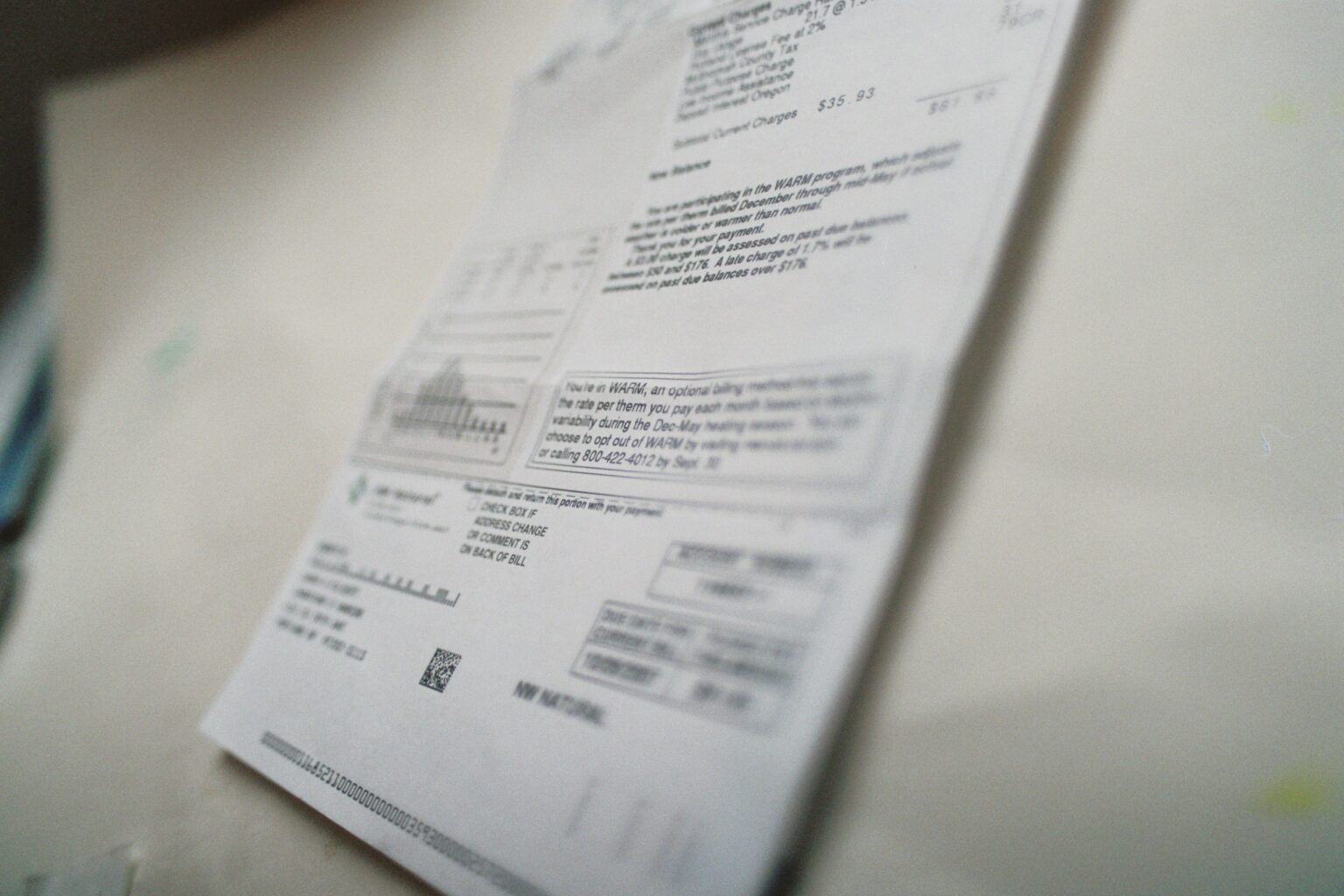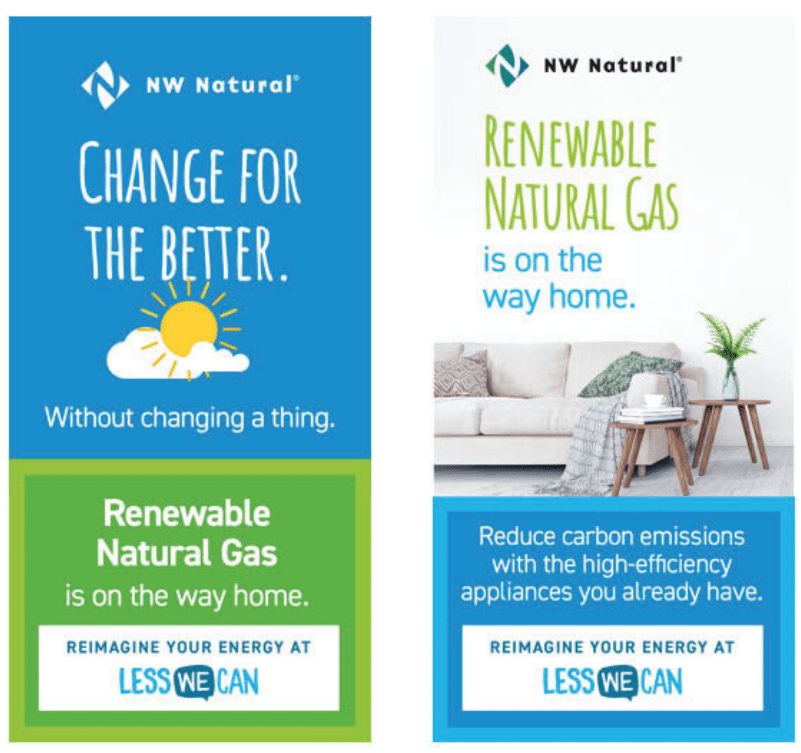NW Natural, a gas utility based in Oregon, is seeking to raise gas bills on its customers in order to pay for millions in executive bonuses, higher returns to shareholders, and a larger advertising budget. It is also hoping to saddle ratepayers with costs associated with the utility’s political activities, in which the company engaged in “misleading” marketing to perpetuate the use of gas at a time when the state is attempting to electrify homes and businesses, a coalition of environmental organizations led by Earthjustice argue in a formal proceeding.
The utility has formally asked Oregon’s public utilities commission (PUC) for a rate increase of more than $70 million, a roughly 12 percent hike over current rates. This comes on the tail of a 13 percent bump that was enacted late last year. If the new increase is approved, Oregon gas customers will see their rates jump 25 percent over 12 months.
The 2021 rate increase was the result of higher commodity costs, which are passed on to customers. Part of the latest proposed increase is connected to investments in IT and safety upgrades, the utility says. But it also contains much more controversial elements.
NW Natural also wants ratepayers to pick up the tab for millions of dollars of executive bonuses and higher returns to shareholders. “Customers shouldn’t be paying for rewards that are about benefiting shareholders,” Bob Jenks, executive director of the Oregon Citizens’ Utility Board (CUB), a residential customer advocacy group, told DeSmog.
He said that the PUC has historically ruled that bonuses should be paid for by shareholders. Not only would it be inappropriate to put that burden on ratepayers in the first place, but it could also result in even more substantial handouts to executives going forward, Jenks added. “Obviously, if it’s funded out of ratepayers, then the shareholders may well be more generous when they give officers bonuses,” he said.
In a response to DeSmog, Dave Santen, a spokesperson for NW Natural, said, “NW Natural targets non-bargaining unit employee total compensation, including for executives, at the market median for utilities based on third-party data for equivalent jobs elsewhere.”
At the same time that NW Natural is seeking higher executive compensation, roughly 375,000, or 25 percent of households across the state — not all of which are customers of NW Natural — struggle to pay their bills. The utility offers some assistance to low-income households, but it is a paltry sum, especially in light of the millions of dollars the company wants to pay its executives.
“The total cost to ratepayers of the low-income bill discount program is approximately $7.4 million. The Commission should compare this cost with the $11 million that NW Natural requests in its petition to pay for executive compensation and salary bonuses — including $4 million for top executives,” Charity Fain, executive director of the Community Energy Project, said in a testimony to the PUC. “NW Natural business executives should not earn recompense from ratepayers through salary bonuses when 25% of Oregonians can barely afford to pay their energy bills.”
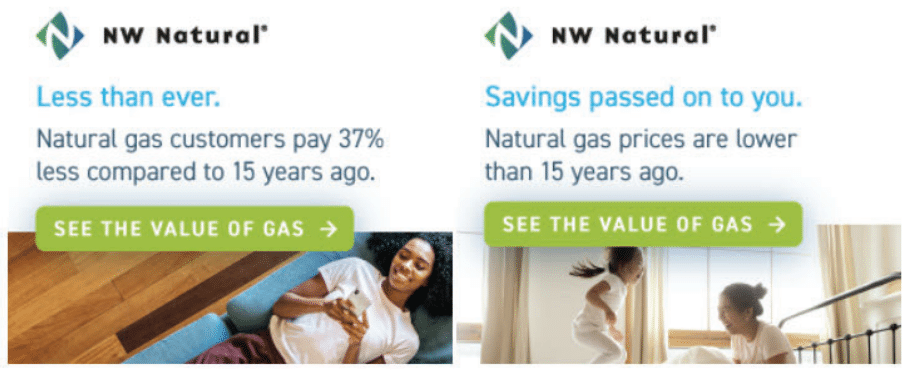
Corporate promotion through ‘misleading’ advertising
NW Natural is also asking the PUC to approve rate increases to cover “additional advertising and media expense” aimed at educating customers on how the utility will decarbonize.
Normally, utilities are allowed to charge ratepayers for advertising that relates to a number of legitimate purposes, such as informing the public about office hours, service repairs, safety, rate structures, and other information that relates to utility systems and how to access services.
Utilities are generally not allowed to recoup costs from ratepayers for advertising that merely promotes the corporation’s image or promotes gas use in an attempt to add customers. A utility needs to clear a very high bar in order to convince the PUC to sign off on allowing ratepayers to cover the cost of this sort of “promotional” or “institutional” advertising.
But that is exactly what NW Natural is attempting to do with its various advertising campaigns, a coalition of environmental groups led by Earthjustice and the Green Energy Institute argue in a testimony opposing NW Natural’s rate increase request.
For example, last year NW Natural paid for digital advertising that suggested that indoor air pollution from cooking occurs regardless of whether the stove is gas or electric. “No matter how you cook,” one ad says, “ventilation is key to healthy indoor air.” While it is true that cooking releases particulate matter regardless of the type of stove, research shows that gas stoves emit additional pollutants that are harmful to human health, including nitrogen dioxide, carbon monoxide, and formaldehyde. This information was omitted from the NW Natural ad, obscuring the health risks of gas stoves.
Its ads also promote the benefits of cooking with gas and why chefs prefer cooking with gas.
Meanwhile, NW Natural also ran an ad campaign to promote “renewable natural gas,” or RNG, which is methane captured from landfills and animal feedlots. The utility has made RNG a core part of its decarbonization campaign, claiming that it can ship RNG to homes and businesses without much effort on the part of the ratepayer.
The campaign is highly misleading, according to Earthjustice and the Green Energy Institute. NW Natural’s digital, TV, and print advertising promotes RNG as a climate solution, ignoring the fact that it is still methane that is burned and contributes to climate change. There is also evidence that suggests RNG is extremely expensive and will have difficulty ever scaling up.
That’s not what Oregon ratepayers are hearing from their utility. In its marketing material, NW Natural’s slogan says “renewable natural gas is on the way home.” However, NW Natural is not actually piping RNG into Oregon homes and businesses at all.
Instead, it has invested in a project with Tyson Foods and BioCarbN, a project developer in Nebraska, which entails capturing methane from animal waste and putting it into the gas pipeline system. Contrary to what NW Natural’s marketing implies, the gas from the Tyson facility does not come to Oregon, but instead is handed over to a gas marketing company in Nebraska and used locally. Instead of physically sending RNG to Oregon households, NW Natural earns “renewable thermal credits” from the RNG sold in Nebraska. This scheme is akin to carbon offsets, allowing NW Natural to claim progress on decarbonization even though it continues sending fossil gas to its Oregon customers just as before. The Nebraska project with Tyson, along with a handful of other similar agreements around the country, add up to credits for RNG sales that are equivalent to less than 2 percent of the utility’s total gas sales in Oregon, representing a tiny portion of the company’s business.
NW Natural told DeSmog that its credits are verified by M-RETS, a third-party renewable energy tracking and validation system, and that RNG turns harmful waste into useful energy.
But the reliance on credits from faraway RNG sales is not clear in the utility’s ads. “That is a very different story than what you are telling the public in your advertising,” Jaimini Parekh, a senior attorney with Earthjustice, told DeSmog. The ads suggest RNG is “being piped to their homes and businesses. That is not what’s happening, and that’s misleading,” she said.
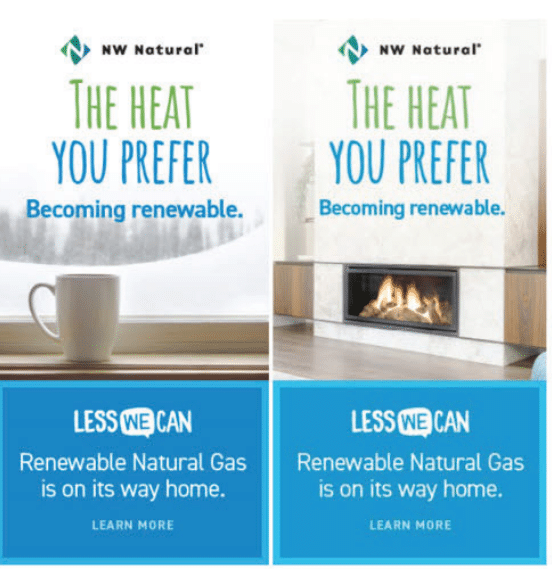
Parekh said that misleading advertising is important because it is an indicator that the point is not to inform the public. If simply providing information to customers was the goal, she said, NW Natural would clearly disclose in its advertising that its RNG program does not deliver RNG to Oregon homes and simply results in credits.
That misdirection has legal implications for the rate increase request, since the PUC allows utilities to pass along advertising costs to customers if that advertising is providing information to customers. If the ads are promotional, recovering costs from ratepayers is much more difficult. “The reason why they are advertising in this way is because they want people to think positively about NW Natural gas utility service. They want to keep people as customers. There are a lot of people in Oregon that are very concerned about climate change,” Parekh said.
Promoting the corporate image, Earthjustice argues, is not a legitimate reason to get ratepayers to cover ad costs.
In response to questions from DeSmog, NW Natural asserted that its advertising is informational. “Our advertising efforts are designed to inform and educate customers about various aspects of our system including safety, consumer information, generation and transmission methods, utility expenses, rate structures, rate increases, load forecasting, environmental considerations, and other contemporary items of customer interest. All are allowed by the PUC,” Santen said.
“Because RNG is a new energy source, we have a responsibility to educate customers about the importance and benefits of RNG before and as we begin to deliver it to their homes and business,” he added.
Environmental groups reject NW Natural’s promotion of RNG as a climate solution. “NW Natural’s RNG campaign is a bait and switch. This is yet another example of NW Natural using ratepayer dollars to advance their bottom line at the expense of public health and our children’s future,” Nora Apter, the climate program director at the Oregon Environmental Council, told DeSmog in an email. “In reality, these investments will only expand our reliance on fossil gas and dig us deeper into climate catastrophe.“
She added that NW Natural’s attempts to get customers to foot the bill for RNG is “a lose-lose situation for the working people of Oregon and a win-win for NW Natural, its shareholders, and executives.”
“Growth is no longer beneficial to the customers”
NW Natural is arguably trying to burnish its image not only to keep existing customers but to attract new ones in the face of rising opposition to gas.
As the climate crisis worsens, climate scientists have called on governments around the world to wind down fossil fuel operations. In response, local authorities have begun to restrict the growth of gas infrastructure. In recent years, more than 50 cities and the state of Washington have adopted building code measures or bans on gas hookups in new residential and commercial buildings.
NW Natural is also on the defensive in its service area. The city of Eugene has made steps towards banning new gas hookups, while Salem is looking at a similar move. Last year, Multnomah County, where Portland is located, ordered new county buildings to be all-electric. More than a dozen Oregon cities have climate targets that may eventually result in restrictions on gas utilities.
But restrictions and a shrinking base are not what gas utilities want, and NW Natural has been tracking the issue closely. It has conducted quarterly polling to see how the public perceives gas and RNG, and whether or not they supported bans on new gas hookups. The utility even commissioned a poll of voters in Eugene that showed strong opposition to a ban on gas connections in new homes and buildings, and then sent those results to the Eugene City Manager in April 2022 as the city was weighing new restrictions on gas infrastructure.
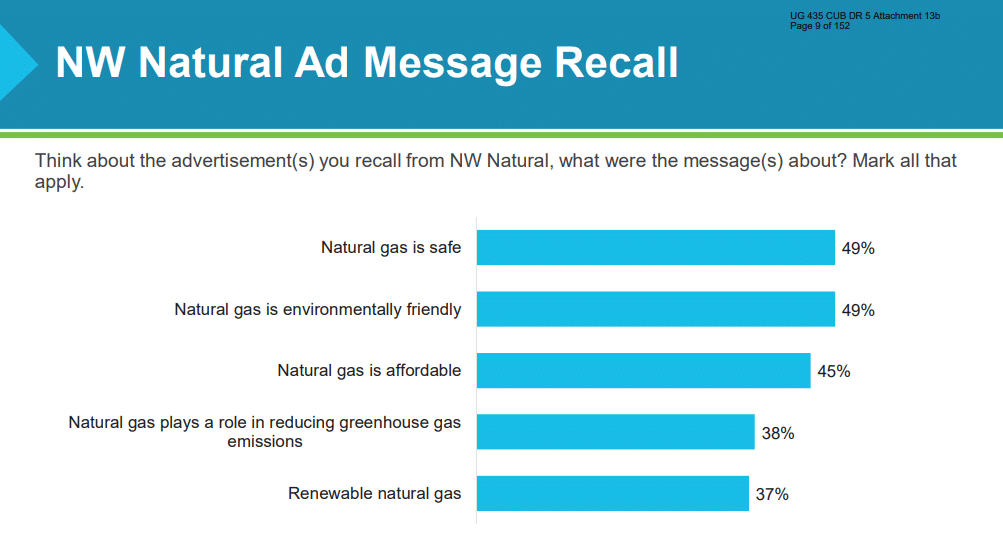
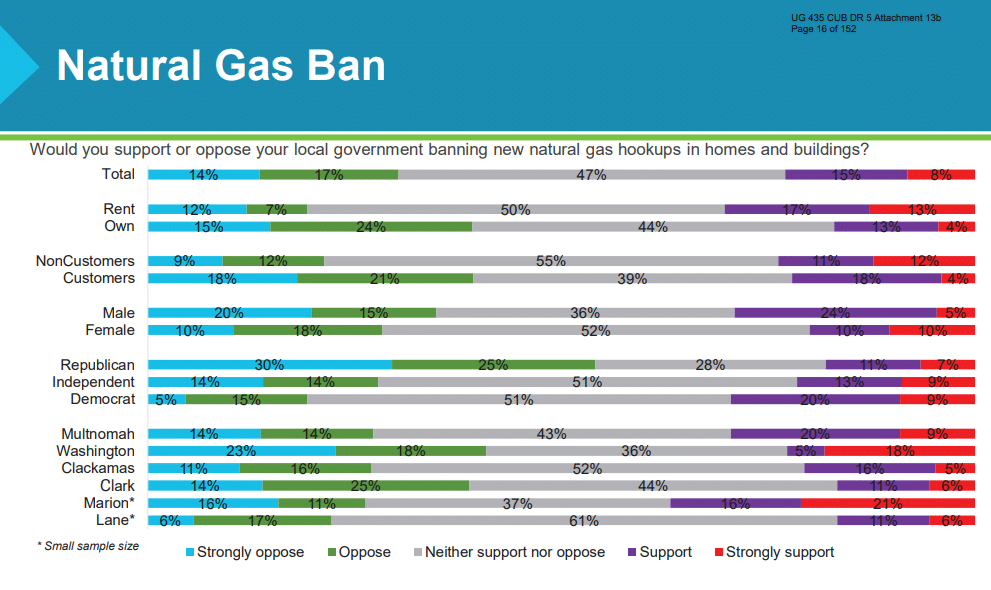
NW Natural is encouraging ratepayers to take up the pro-gas fight. In December 2021, Oregon finalized its Climate Protection Plan, which requires gas utilities to cut their emissions in half by 2035. NW Natural has promoted its position as a climate leader, but is simultaneously suing the state to stop the Climate Protection Plan.
In multiple emails to ratepayers, NW Natural said it “supports the goal of reducing carbon emissions,” but opposed the Climate Protection Plan as written. In the email, the utility asked readers to take action by submitting public comments to regulators, and provided a series of talking points.
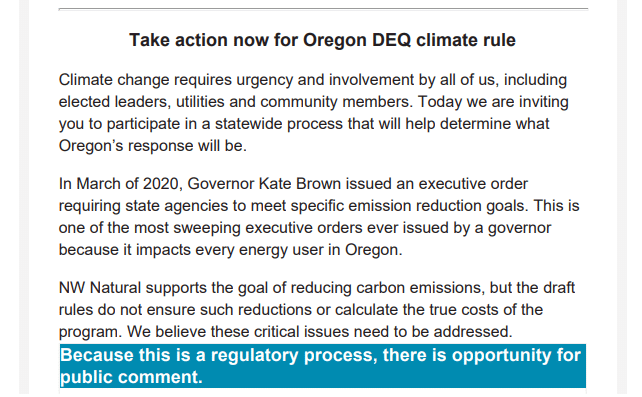
“It is very hard to decarbonize gas utility service, so it is not in the public interest or in the interest of ratepayers to be paying for advertisements that are improving the image of this company and that are seeking to encourage people to connect to gas utility service under the impression that somehow they are receiving renewable natural gas,” Parekh said.
NW Natural is also asking ratepayers to foot the $506,000 dues it paid to the American Gas Association, an industry trade group that has worked hard through lobbying and influence campaigns to halt the trend towards electrification in recent years. As it happens, NW Natural’s CEO, David Anderson, was the chair of the American Gas Association in 2021 and continues as an officer with the industry group.
Parekh said that the PUC has previously stated that asking ratepayers to pay for the costs of lobbying is inappropriate because the lobbying can harm ratepayer interests.
Taken together, this misleading PR, internal polling and messaging, and NW Natural’s calls to ratepayers to “take action” against the state’s climate policy, show that the utility is not merely attempting to inform the public, but is instead running a political influence campaign, Earthjustice and its coalition alleged in formal testimony to the PUC submitted in April. And if NW Natural succeeds in its rate request, its customers will pay for this apparent effort to maintain and grow the gas customer base, a mission that Earthjustice and other critics say is no longer acceptable.
“We are in a time of climate crisis. We don’t need more customers being connected to the gas utility service,” Parekh said.
Jenks, with the residential customer advocacy group, agreed, but viewed it through the lens of a risk to ratepayers. Jenks acknowledged that it will be very difficult for gas utilities to decarbonize, so at a minimum, he said continuing to grow the customer base should be off the table.
“Our belief is when you overlay carbon regulation, growth is no longer beneficial to the customers and the system,” he said. If customers are added to the gas system, it gets increasingly difficult to decarbonize it, and becomes more and more costly to existing ratepayers.
“The one thing they don’t want to do is to do anything that reduces the number of customers,” Jenks said, referring to NW Natural.
But, he said, when it comes to greenhouse gas emissions, NW Natural is “in a hole,” and without changing course the state will struggle to reach its climate goals. “We don’t know how we’re going to meet the requirement of 50 percent reduction,” he said. “If you’re in a hole and you don’t know what to do, the first thing you do is stop digging.”
Correction: This article originally stated that Jaimini Parekh is a senior associate attorney with Earthjustice. It has been corrected to reflect Parekh’s title as senior attorney with Earthjustice.
Subscribe to our newsletter
Stay up to date with DeSmog news and alerts


